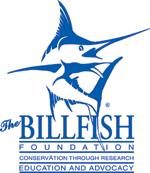 SAN JOSE, Costa Rica – The ban on exports of sailfish meat and on the use of live bait by commercial long-liners approved in mid-December by the Costa Rican fisheries agencies has been applauded by the Billfish Foundation (TBF) as a major step on the way to protect sailfish and other sportfishing resources. SAN JOSE, Costa Rica – The ban on exports of sailfish meat and on the use of live bait by commercial long-liners approved in mid-December by the Costa Rican fisheries agencies has been applauded by the Billfish Foundation (TBF) as a major step on the way to protect sailfish and other sportfishing resources.
“The primary concern was the exportation of sailfish meat which now will no longer be allowed, as well as stopping the use of live bait by commercial long-liners,” said TBF Central American Conservation Director Herbert Nanne following release of the final agreement by the Costa Rican Fisheries and Aquaculture Institute INCOPESCA (Instituto Costarricense de Pesca y Acuicultura).
Groups like the TBF along with sportfishing captains and owners have been pushing the Costa Rican government for years to enact stronger conservation measures to protect sailfish from commercial fishing, first starting with Costa Rica's Catch and Release program.
Besides banning sailfish exports, the final INCOPESCA agreement prohibits use of live bait on long-lines which kill many sailfish; makes commercial long-liners get a special INCOPESCA license to capture live bait; and requires both sportfishing anglers and commercial long-liners to properly release sailfish, marlin and swordfish by cutting the line near the leader or as close as possible to the hook without taking the fish out of the water.
TicoTimes.com Editors Note: Costa Rica captains for years have been using the circle hook, this prevents injury to the fish and allows easy release without having to cut the leader, which still leaves the hook in. The fish is removed from the water only for a few seconds so the angler can take a picture of his trophy. Special care is used, like a mat on the boat rail and gloves. See the above video on catch and release.
The new regulations also prohibit sportfishing enthusiasts from using gaffs to bring fish close to the boat or to pull fish on-board for photos.
Nanne said INCOPESCA will form a special committee of its regional directors, sportfishing sector representatives from Golfito and Quepos, and the Costa Rican Coast Guard to oversee compliance with the new regulations.
Nanne added the conservation measures are the result of the work of many people involved in the Costa Rican Sailfish Conservation Front such as Donald McGuinness (his brother is Bobby McGuinness, chosen world’s top captain of 2006 by the IGFA), Todd Staley of Crocodile Bay Lodge, and charter/broking services like Costa Rica Fishing, among others.
"These sailfish conservation measures are significant. They are the first in more than a decade in Costa Rica,” said TBF President Ellen Peel, “and we are proud that the collective efforts of many local people were responsible for this victory."
Nanne also praised the new president of INCOPESCA, Luis Dobles, and its board of directors for working diligently with the sportfishing representatives.
TBF scientific director Russell Nelson said there are still concerns about the vulnerability of sailfish in certain areas. The sportfishing group had asked, among other measures, for a total ban on long-line commercial fishing along the South and Central Pacific coast to 30 miles out between January 1 and May 31, but this has not yet been approved.
Even so, said Nelson, “those measures which did pass are a much needed start to the expansion of conservation measures,” said Nelson.
TBF President Peel said the TBF will continue to work with the Costa Rican sportfishing and tourism industries for aggressive billfish conservation measures.
The Billfish Foundation was established in 1986 and is the only non-profit organization dedicated solely to conserving and enhancing billfish populations worldwide. With world headquarters in Ft. Lauderdale, FL, USA, TBF’s comprehensive network of members and supporters includes anglers, captains, mates, tournament directors, clubs, sportfishing and tourism businesses. It works for conservation measures that will protect billfish resources, help recreational anglers pursue their sport, and promote the local economy and recently helped spearhead the. Costa Rica Billfish Agreement
Read more on the Costa Rican Conservation Agreement |
 Article Details
Article Details
